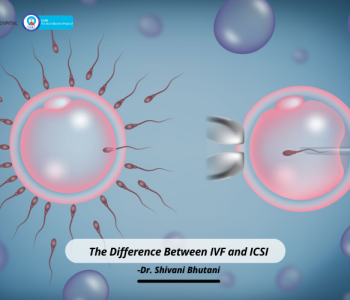 Eva Hospital
Eva Hospital
The Difference Between IVF and ICSI
While we discuss the various techniques used in infertility treatments, we hear various terms such as IVF, ICSI, and IUI. However, we do not fully understand whether they are different processes or part of the same process.
Many people think that all these are part of the in vitro fertilization option as a whole, but not entirely. Some assume that one is an alternative to the other. Sometimes the terms IVF and ICSI are used interchangeably which is also not correct.
What are IVF and ICSI?
Both the above are methods of fertilizing the egg outside the body in a laboratory. But they are not different processes. Intracytoplasmic sperm injection is an optional part of in vitro fertilization and is used in certain specific situations.
In other words, ICSI is a specialised kind of IVF that is used primarily for the treatment of extreme cases of male infertility. It involves injecting a single sperm directly into a mature egg.
You may note that during IUI, male cells are placed directly inside the womb in the hope that at least some of them will have good motility and morphology to enter a mature ovum.
Difference of IVF and ICSI
The fundamental difference between IVF alone or combined with ICSI is how the sperm fertilizes the egg. In the former, the egg and sperm are brought together in a petri dish, and left alone for nature to take its course.
Some of the sperm will enter the eggs and fertilize them. In the intracytoplasmic sperm injection method, selected sperms are directly injected into the egg.
Since it is a manual process, it eliminates risk factors such as fertilization by multiple sperm or the failure of male gametes to enter the egg cells. Embryologists get better results by incorporating ICSI in the IVF cycle in certain cases.
When Do Embryologists Utilize IVF-ICSI?
When one or most of the following conditions are there, IVF-ICSI is used:
- High sperm DNA fragmentation.
- Previous fertilization failure.
- Use of frozen sperm.
- Use of frozen eggs.
- The poor sperm motility, count, or shape.
- The previous cycle did not yield fertilized embryos.
- Due to poor embryo quality among others.
- Unexplained fertility.
The Process
Following the administration of fertility drugs to the female, sufficient high-quality ova are collected by the doctors from the uterus or fallopian tubes. This is called egg retrieval.
These are then shifted to a culture medium & kept in an incubator that controls temperature, humidity and other environmental parameters.
When the eggs have matured, doctors collect semen samples from the male partner- it is called sperm retrieval. Now, the embryologist has to mix the mature eggs with chosen healthy sperm that has been selected from the semen sample.
At this stage, if sperm morphology is not suitable, ICSI is used to directly inject the sperms into the eggs and increase the chances of fertilization.
The results are checked after sixteen to eighteen hours. The fertilized eggs or embryos are then implanted in the uterus – it is called implantation.
ICSI is a relatively new technique, it has been in use since 1992. Dr Shivani Bhutani, M.S, F.M.A.S, an IVF specialist at Eva Hospital, Ludhiana, explains: “ICSI enables the embryologist to select the best sperms from the sample and then inject it directly into the egg. It eliminates the ambiguity factor and ensures that the sperm enters the egg.
Are Babies Born with ICSI Normal?
Yes, offspring born by using assisted reproductive technology(ART) is as normal as babies born naturally. Studies have found no conclusive evidence that indicates behavioural or physiological abnormalities.
The researchers have examined the birth weight, growth, IQ, development, and behaviour issues and found them normal as compared to children who were conceived naturally.
IVF-ICSI at Eva Hospital
Our hospital has been rated as one of the best IVF Hospitals in Ludhiana. We have state of the art facilities for various infertility treatments including IUI, IVF-ICSI, male infertility, PCOS, and gynaecological services too.
Also Read: How Do You Fix Implantation Failure?
It is known for its high live birth rate, more than 78 per cent successful cases & cost-effective treatments. We know how critical it is to give birth to a couple who are struggling with failed treatments.
We ensure that costs are kept at a minimum by only opting for procedures that are essential. by eliminating unnecessary procedures, treatments do not pose a monetary constraint to couples seeking parenthood.
The ICSI Treatment at Eva Hospital is very affordable and hence conceivable for people of all income groups to have a consultation with our experts on your eligibility for various advanced treatments, connect with our counsellors & get help immediately.